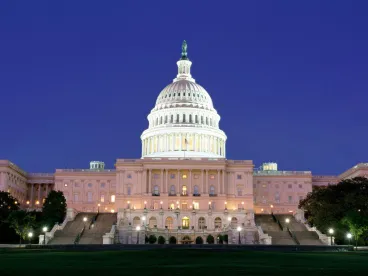2020 Preview. Federal lawmakers returned to Washington, D.C., this week to kick off the second session of the 116th Congress. With national political elections 10 months away, the policy debates will be amplified, and the stakes will become higher. It will no doubt be a bumpy and unpredictable ride, so here are just a few of the major policy matters the Buzz will be monitoring as we head into 2020.
-
United States–Mexico–Canada Agreement (USMCA). While U.S. Senate Majority Leader Mitch McConnell (R-KY) will continue to focus on confirming federal judges and executive branch nominations, passage of the USMCA will undoubtedly be one of his top priorities. The U.S. Senate Committee on Finance approved the USMCA earlier this week, and at least five other Senate committees will weigh in next week (including the S. Senate Committee on Health, Education, Labor and Pensions, which will focus on the labor provisions of the agreement). This means that the agreement could receive a vote on the Senate floor in the next few weeks.
-
Labor reform legislation. The Buzz has written extensively about the Protecting the Right to Organize Act of 2019. The bill has been on the precipice of a vote on the floor of the U.S. House of Representatives since it made it through the U.S. House Committee on Education and Labor back in late September 2019. The bill already has 218 cosponsors, which is enough for passage. Look for a vote in the coming weeks.
-
Joint-employer regulations. The year 2020 could be the year of the joint-employer regulation. The U.S. Department of Labor’s proposed Fair Labor Standards Act joint-employer regulation cleared the Office of Information and Regulatory Affairs (OIRA) on December 20, 2019, meaning that it could be finalized at any moment. The National Labor Relations Board (NLRB) is expected to finalize its joint-employer regulation soon as well. Finally, the Equal Employment Opportunity Commission is expected to issue a joint-employer proposal of its own.
-
H-1B matters. Will the new electronic H-1B registration system launch smoothly, or will it result in March Madness? Will United States Citizenship and Immigration Services issue proposals concerning H-1B reform and/or H-4 work authorization?
-
Supreme Court decisions. While decisions from the Supreme Court of the United States on Deferred Action for Childhood Arrivals and LGBTQ protections are probably months away, the rulings—no matter which way they go—will likely have ripple effects both in Congress and on the campaign trails.
OT Is On! Could we be nearing the end of the overtime regulation saga that began in 2015? The final changes to the overtime regulation that dropped in September 2019 went into effect on January 1, 2020. So far, there has been no legal challenge to the regulation, likely due in part to the difficult optics of challenging a regulation that increases overtime eligibility for more than 1 million workers.
OFCCP Proposes Changes to Audit Procedure. On December 30, 2019, the Office of Federal Contract Compliance Programs (OFCCP) issued a notice of proposed rulemaking that would codify procedures “to provide federal contractors and subcontractors with greater certainty about the procedures that OFCCP follows during compliance evaluations to resolve employment discrimination and other material violations.” In part, the proposal seeks to codify guidance on predetermination notices in discrimination cases, as well as to clarify the type and strength of evidence that is required for finding discrimination. Comments are due by January 29, 2020.
Reg Czar Confirmed. On January 9, 2020, the Senate confirmed Paul J. Ray as administrator of OIRA. As Buzz readers know, though it may be obscure, OIRA plays an enormous role in the federal regulatory process. Ray will no doubt have a busy 2020 as the administration advances its regulatory agenda ahead of the November elections.
Senate Fast Break. Kelly Loeffler was sworn in this week as the newest senator from Georgia. The American businesswoman—who is part owner of the WNBA’s Atlanta Dream—got an assist from Georgia governor Brian Kemp and was appointed to fill the vacancy created by the retirement of Johnny Isakson at the end of 2019. This is a career layup for Loeffler, considering she didn’t have to go through the full-court press of a political campaign. However, Loeffler can’t afford to sit on the bench for too long, as she’ll need to box out challengers to the seat in a special election set for November 3, 2020. Interestingly, Loeffler is not the first senator to be an owner of a professional basketball team. Herb Kohl, who represented Wisconsin from 1989 to 2013, owned the NBA’s Milwaukee Bucks from 1985 to 2014. Of course, only time will tell if Loeffler’s appointment will be a slam dunk for Georgians.




 />i
/>i

